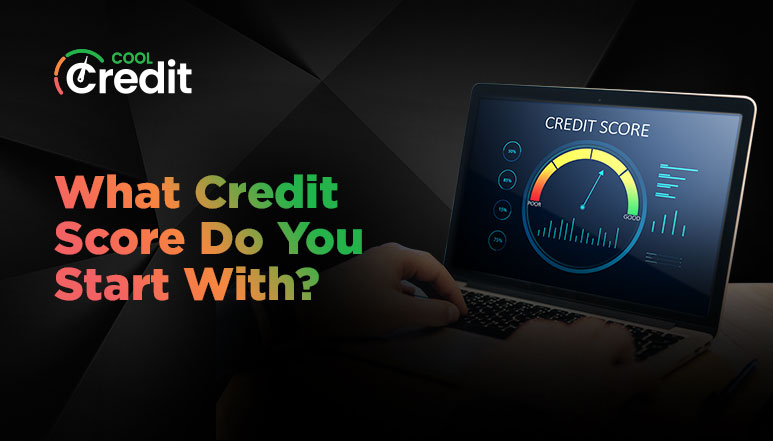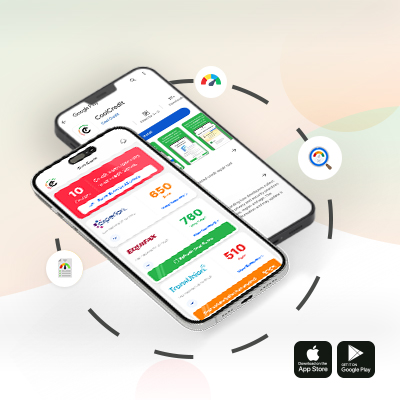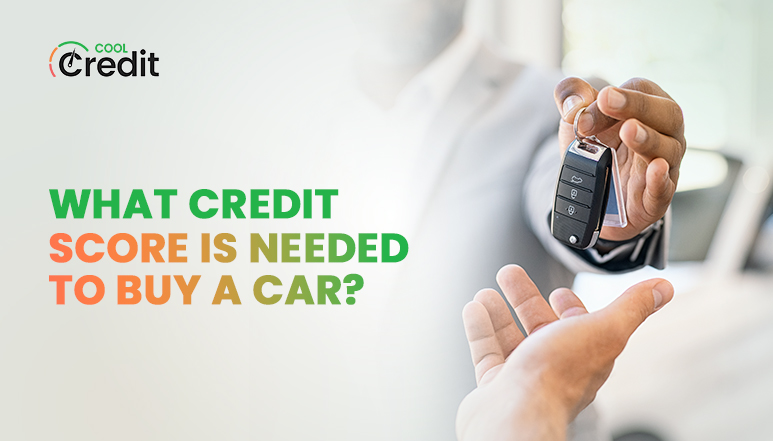
What Credit Score Do You Start With?
Key Takeaways
▪ Whether you have a credit history or haven’t built one yet, your credit score does not start at 0.
▪ Your beginning score will still have three digits. It’s because the lowest credit range starts at 300, so your starting credit score cannot be less than 300.
▪ When you have not yet built a credit profile, you will be considered “credit invisible”.
According to the Consumer Financial Protection Bureau (CFPB), approximately 26 million adults (one out of ten) are considered to be "credit invisible", meaning they have no credit history as they're without credit loans and other lines of credit.
In today’s time building and maintaining a good credit score or credit history is definitely worth considering, especially in the long run. This is because not having a credit score might do no harm, but having an excellent one can do a lot of good.
Now, there are many questions that people just starting off their credit building journey have, and one in particular remains a common curiosity for many - “What does your credit score start at" or "What credit score do you start with". And in this blog, we’ve tried to answer it, among other things, of course. Firstly, to answer the question - there's no definitive ‘default credit score’ or ‘beginning credit score’ that you start with.
Ready to transform your credit score?
Tap into AI Credit Repair & start seeing results today!
Factors That Influence Your Initial Score
Your initial credit score is determined on the basis of certain factors, including:
(a) Payment Behavior
(b) Credit Mix
(c) Credit Inquiries
(d) Public Records
Let's learn about them in detail:
- Payment Behavior: Your default credit score is influenced by how promptly you make payments on any credit accounts you have. On-time payments generally have a positive impact.
- Credit Mix: The types of credit you have, such as credit cards or installment loans, can affect your beginning credit score. A diverse mix of credit types can be beneficial.
- Credit Inquiries: When you apply for credit, a hard inquiry is made on your credit report. Multiple inquiries within a short period can impact what credit score you start with.
- Public Records: If you have any public records, such as bankruptcies or judgments, these can significantly affect what your credit score starts at.
If you make responsible financial decisions, your credit score will likely be much higher than the minimum, i.e., 300. In fact, after the first few months of building credit, most people will have a "beginning credit score" between 500 and 700.
With that said, it's also important to understand that essentially, you have no credit score UNTIL a lender needs a way to assess your creditworthiness, i.e., when you apply for, say, a loan or a credit card.
Now, let's discuss what it means to not have a credit score and how you can acquire one despite needing credit.
What It Means to Not Have a Credit Score
To begin, let's look at the upsides of what it means to not have a credit score:
◾ You're Debt Free: On the plus side, not having a credit score may indicate that you haven't taken on debt or used credit extensively. This is especially great if you are all for a debt-free lifestyle.
◾ You Pose Limited Risk: If you don't have a credit score, you mostly don't have a credit history either. This means there's no record of missed payments or defaults in your name, reducing the perceived risk for potential lenders.
◾ You're Financially Independent: Considering the first two points, you might rely more on your income and savings, which means you're quite financially independent.
Now, even though the upsides look real good, there are also certain downsides to consider:
◾ You May Have Limited Access to Credit: Many lenders use credit scores to evaluate loan applications. Without a credit score, you may have difficulty obtaining loans or credit cards.
◾ You May Face Higher Interest Rates: If you manage to secure credit without a credit score, you may be considered a higher-risk borrower, resulting in higher interest rates.
◾ You May Encounter Difficulty Renting or Leasing: Landlords and leasing companies often check credit history when evaluating rental applications. Not having a credit score could make it harder to rent a property.
◾ You May Be Posed With Limited Opportunities: Some employers, particularly in financial and sensitive industries, may check credit reports as part of the hiring process. Not having a credit history might limit job opportunities.
And now that you have a fair understanding of how your initial credit score is determined, and the upsides and downsides of not having a credit score, let's move on to the next big question- how do you build or maintain a good credit score? But, before we begin, let's go over credit score ranges.
Basics of Credit Score Range
Credit Score Ranges and What They Entail
| Credit Score Range | Category | What It Entails |
| 300 - 579 | Poor | Individuals in this range may have difficulty obtaining credit or may be offered high interest rates. It indicates a high risk of default. Improving credit habits is essential. |
| 580 - 669 | Fair | While you may qualify for some credit, interest rates are likely to be higher than average. Focus on improving your credit habits to move into a better range. |
| 670 - 739 | Good | Individuals in this range are considered to be lower risk, and they usually qualify for better interest rates on loans. Continue to manage credit responsibly. |
| 740 - 799 | Very Good | This is a strong credit score range, and individuals can typically access the best interest rates and terms. Maintain good credit habits to continue enjoying favorable terms. |
| 800 - 850 | Excellent | An excellent credit score signifies a low risk of default. Individuals in this range are likely to be offered the best interest rates and terms available. Continue to manage credit responsibly. |
How to Build your Credit from Scratch
- Get a Secured Credit Card: If you're ready to begin your credit-building journey but need to establish credit, consider getting a secured credit card. Ideally, choose one where you provide a deposit that serves as your credit limit. By responsibly using this card, you can build a positive credit history.
- Apply for Credit-Builder Loan: Another way is to turn to financial institutions that offer credit-builder loans. Yes, as the name suggests, that is mostly their sole purpose, building or improving credit.
- Become an Authorized User: If the above options seem unsuitable, simply ask a family member or friend if they can add you as an authorized user on their credit card account. In plain language, this can help you piggyback on their positive credit history.
Boost your credit with AI Credit Repair App!Tap into AI Credit Repair & Start improving your score instantly.
Get StartedHow to Build a Good Credit Score
Now, assuming you have a credit score and aim to maintain a good credit score, here are a few tips to keep in mind:
- Pay all your bills on time—every bill, always.
- Don't go overboard with your credit utilization; try to keep it below 30%.
- Apply for credit sparingly to avoid negative impacts on your score.
- Keep older accounts open to prolong the length of your credit history.
- Regularly review your credit scores and analyze your credit reports. You can do this using credit repair apps like CoolCredit.
- Only apply for credit when you really need it to minimize hard inquiries.
- Budgeting is important; it will help ensure you never miss a payment and reduce your reliance on credit.
- Save up rainy day funds to reduce dependence on credit in times of financial distress.
- Keep track of your credit journey using an AI-assisted, DIY Credit Repair App like CoolCredit.
Tips to Help You Stay on Top of Your Credit
Once you have built your credit on your own, you’d want to maintain it in good standing. Here’s how:
- Regularly review your credit reports from Equifax, Experian, and TransUnion.
- Make sure to check for any inaccuracies or mistakes in the credit report. Here’s what you should look for: incorrect name, incorrect balances, open credit accounts and their balances, and any unfamiliar accounts or charges.
- You can use apps like the CoolCredit AI-assisted app to easily and instantly analyze and detect negative items on your credit report. It can also provide step-by-step assistance in specific areas for credit improvement.
- If you see any mistakes or unfair charges, you need to immediately raise a dispute before it harms your credit standing any further. You need to draft an evidence-backed dispute letter for efficient credit disputes. For this, the CoolCredit app can come in handy as it has ready-to-use dispute letter templates, saving time.
- After raising a dispute, you still need to track the status of your dispute and whether the changes have been reflected on your credit report. You can track credit repair progress in real time using CoolCredit.
Additionally, it’s best to access resources to understand credit factors better and make well-thought-out financial decisions. You can get all the information, resources, and assistance you need by downloading the CoolCredit app.
Conclusion
While being 'credit invisible' isn't necessarily detrimental, having a good credit score offers numerous advantages. However, when you embark on your credit journey, it's important to note that there's no fixed starting point or 'default' credit score. Instead, your initial credit score is determined by factors such as limited credit history and payment behavior. Further, to build good credit, consider acquiring a secured credit card or a credit-builder loan. To ensure the process isn't overwhelming and is rather smooth, use the ai credit repair- CoolCredit app.
FAQs
Q: What's a Normal Credit Score?
A: Typically, credit scores range from 300 to 850. And even though a "normal" credit score can vary, according to most scoring models, a score above 670 is considered good, and is perceived as normal.
Q: What Score Does Your Credit Start At?
A: Even though there's no definitive 'beginning credit score', or 'default credit score', the credit score you start with typically ranges from 500 to 700. However, it can start from 300, as that is the lowest possible credit score on the chart. Building credit from this point requires responsible financial behavior over time.
Q: What Is a Good FICO Credit Score?
A: FICO credit scores, one of the most widely used scoring models, categorize scores as follows:
- Poor: 300-579
- Fair: 580-669
- Good: 670-739
- Very Good: 740-799
- Excellent: 800-850
Accordingly, a FICO credit score of 670 or higher is widely regarded as good.
Q: How to Get My Credit Score from 500 to 700?
A: Improving your credit score is a gradual process that requires commitment and strategic actions. Here are a few steps to follow to raise your score from 500 to 700:
- Check your credit report
- Pay bills on time
- Reduce credit card balances
- Establish a positive credit history
- Diversify credit types
- Be patient
Explore Similar Blogs
1. How Often Does Credit Score Update?





